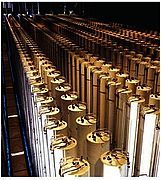Better to Purchase or Enrich Domestically?
» Disagreements Continue in Tehran Over Vienna Agreement
While Iranian authorities have not yet issued their final response to the proposal put forward by the International Atomic Energy Agency’s (IAEA) to enrich Iran’s uranium abroad in Russia and France, opposition to the plan continues to brew among senior officials in Tehran.
In the latest criticisms against the plan, yesterday the new judiciary chief Sadegh Larijani said, “Sending uranium abroad is suspect, and it seems like such compromise over the nuclear energy issue is not in the country’s interest. According to the N.P.T., advanced nations are obliged to provide Iran with its needed uranium.”
Criticizing the proponents of the plan, who mostly belong to the camp of Ahmadinejad’s supporters, Larijani added, “On the issue of nuclear energy the Iranian nation and state have shown admirable resistance and we cannot easily ignore our interests with respect to this issue.”
Last week, and following the Vienna talks and the proposal to enrich Iran’s uranium abroad, Sadegh Larijani’s brother, Majlis speaker Ali Larijani also voiced his opposition to the proposal: “The feeling I have is that the Westerners are insisting on going in a direction to cheat and impose their will on us. They said we will provide you with 20 percent enriched nuclear fuel when you hand over to us your enriched material, whereas we do not see any relation between these two issues.”
The remarks by the Larijani brothers, who head the judiciary and legislative branches in Iran, follow those of other prominent figures such as Majlis vice-speaker Mohammad Reza Bahonar and head of the Majlis national security and foreign policy committee, Alaeddin Boroujerdi, who have publicly announced their opposition to enrich Iran’s uranium abroad.
Yesterday, several other Majlis representatives also voiced their opposition to the plan to transfer uranium enriched below 5 percent in Iran to foreign countries in exchange for 20 percent enriched uranium. Such remarks can influence the fate of the proposed deal.
In this connection, Kazem Jalali, spokesperson for the Majlis national security and foreign policy committee said, “Out of the proposed package by the Islamic Republic of Iran, which was a comprehensive package, the Western world has chosen a deviated and insignificant issue in order to poison minds against the Islamic Republic’s proposed package.”
Majlis vice-speaker Mohammad Hassan Abutorabifard announced, “We must not give up anything in order to receive fuel for Tehran’s research reactor from countries that are able to provide us with it.”
Opposition to the proposal facing Iran for the enrichment of its uranium for the Tehran reactor is heating up while yesterday IRNA, the administration’s official news agency, ran a comprehensive interview with the Russian ambassador in Tehran in an attempt to defend Ahmadinejad’s remarks on Iran’s readiness to ship its uranium abroad and change the minds of the proposal’s opponents.
Responding to Ali Larijani and other politicians who have denounced the proposal to allow Russia and France to enrich Iran’s uranium as deception, the Russian ambassador said, “This proposal is not a deceptive tactic to confiscate Iran’s low-enriched uranium. We believe that signing technical agreements for the provision of fuel for the Tehran reactor is in Iran’s interest and will aid in resolving the nuclear issue.”
The Russian ambassador also claimed that Russia has not struck any deals with the United States over Iran in exchange for the latter’s abandonment of the missile shield plan, although he admitted that Russia regards the development as a positive step by the United States.


